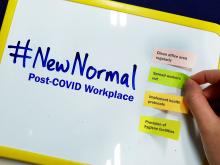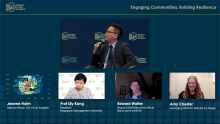From income losses and social distancing to interruptions in healthcare provision, the Covid-19 pandemic continues to disrupt the lives of many around the world.
The Covid-19 pandemic has caused unprecedented devastation across the world. Lives and jobs have been lost, the healthcare sector has been stretched thin, and a shared sense of loneliness and despair has rippled across the globe. Yet, as a community, we have not suffered equally.
When both the rich and the less privileged had to undergo lockdowns and fell ill last year, many thought that Covid-19 would serve as a much-needed equaliser. But as the crisis quickly unfolded, deep inequalities within our society were brought to light.
In light of the ongoing pandemic, changing financial landscape and evolving job market, are the young adults in Singapore able to withstand financial challenges that come their way? How financially literate and resilient are they?
These are key questions the Citi Foundation-SMU Financial Literacy Programme for Young Adults aims to understand in its inaugural survey conducted between March and April 2021.
Extreme weather events point to an increasingly dangerous roulette game we play. Individuals and businesses can do their part but governments must do more at the upcoming Glasgow climate conference.
Imagine you are in a casino where the roulette wheels have only red and black colours. You win if the ball falls on black, and the house wins on red. Currently, more black than red slots exist, so it is a tempting game to play as the odds are in your favour.
Two startups from Singapore Management University’s (SMU) Business Innovations Generator (BIG) incubation programme emerged as winners at the HSBC Swing for the Game Changers 2021 competition.
Magorium and Crunch Cutlery impressed judges with their sustainable solutions to reduce plastic waste in Singapore. They were recognised as the nation’s very own game changers, inspiring others to be forward-looking and ambitious in creating a better and more sustainable future for all.
Singapore may rank high in its rate of Covid-19 vaccination. However, segments of the nation’s older adults, aged 71 to 75, were still reluctant to take the jab due to skepticism over the efficacy and safety of the vaccines. A study conducted by Singapore Management University’s (SMU) Centre for Research on Successful Ageing (ROSA) from February to June 2021 also revealed that respondents who did not intend to vaccinate were less socially integrated.
Employers have strong grounds to do so but should avoid differentiating for wrong reasons like presenteeism, Singapore Management University’s Jared Nai says.
When the Government again relaxes rules and allow more to return to the office in Singapore, we probably will not see huge swings in work arrangements.
At least not immediately, when many big business names around the world are allowing employees to continue working from home (WFH) on some days, likely prompting others to follow suit.
Universities play a key role in building resilience, said SMU President, Prof Lily Kong. Research done by universities can make a difference in strengthening societies and communities. The academic sector contributes through the graduates whom universities nurture, who go on to add value by creating solutions and ideas that address adversities faced by societies.
SMU welcomed Mr Amit Midha, President of Asia Pacific & Japan and Global Digital Cities at Dell Technologies, as the first keynote speaker of the Presidential Distinguished Lecturer Series (PDLS) of 2021 held at SMU Hall on 31 March.
SMU President Professor Lily Kong hosted the hybrid event which was attended by close to 350 SMU students, staff and faculty, polytechnic and junior college students, and teachers, as well as government, media and industry representatives.
In an episode of Changemakers' Conversations, a panel of speakers share their journeys on creating value in sustainability.
In the ‘Science’ section of Impossible Foods’ website is a page with the giant headline: HEME + THE SCIENCE BEHIND IMPOSSIBLE™. The page explains thus:
“Heme is what makes meat taste like meat. It’s an essential molecule found in every living plant and animal -- most abundantly in animals -- and something we’ve been eating and craving since the dawn of humanity.”












